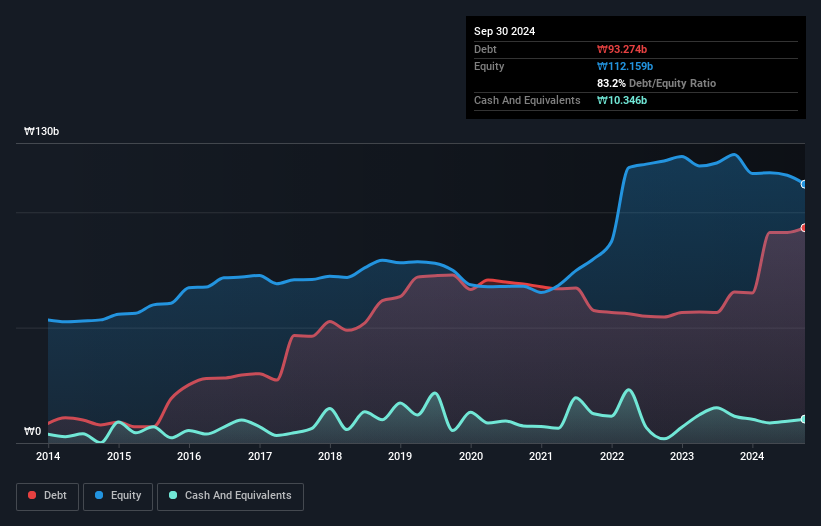- South Korea
- /
- Consumer Services
- /
- KOSDAQ:A063170
Seoul Auction (KOSDAQ:063170) Is Making Moderate Use Of Debt

Legendary fund manager Li Lu (who Charlie Munger backed) once said, 'The biggest investment risk is not the volatility of prices, but whether you will suffer a permanent loss of capital.' It's only natural to consider a company's balance sheet when you examine how risky it is, since debt is often involved when a business collapses. Importantly, Seoul Auction Co. Ltd. (KOSDAQ:063170) does carry debt. But is this debt a concern to shareholders?
When Is Debt Dangerous?
Debt is a tool to help businesses grow, but if a business is incapable of paying off its lenders, then it exists at their mercy. Part and parcel of capitalism is the process of 'creative destruction' where failed businesses are mercilessly liquidated by their bankers. While that is not too common, we often do see indebted companies permanently diluting shareholders because lenders force them to raise capital at a distressed price. Of course, plenty of companies use debt to fund growth, without any negative consequences. The first step when considering a company's debt levels is to consider its cash and debt together.
Check out our latest analysis for Seoul Auction
What Is Seoul Auction's Debt?
You can click the graphic below for the historical numbers, but it shows that as of September 2024 Seoul Auction had ₩93.3b of debt, an increase on ₩65.4b, over one year. However, it also had ₩10.3b in cash, and so its net debt is ₩82.9b.

How Healthy Is Seoul Auction's Balance Sheet?
The latest balance sheet data shows that Seoul Auction had liabilities of ₩45.0b due within a year, and liabilities of ₩61.8b falling due after that. On the other hand, it had cash of ₩10.3b and ₩25.2b worth of receivables due within a year. So it has liabilities totalling ₩71.3b more than its cash and near-term receivables, combined.
This deficit is considerable relative to its market capitalization of ₩105.6b, so it does suggest shareholders should keep an eye on Seoul Auction's use of debt. Should its lenders demand that it shore up the balance sheet, shareholders would likely face severe dilution. There's no doubt that we learn most about debt from the balance sheet. But you can't view debt in total isolation; since Seoul Auction will need earnings to service that debt. So when considering debt, it's definitely worth looking at the earnings trend. Click here for an interactive snapshot.
In the last year Seoul Auction had a loss before interest and tax, and actually shrunk its revenue by 58%, to ₩21b. To be frank that doesn't bode well.
Caveat Emptor
While Seoul Auction's falling revenue is about as heartwarming as a wet blanket, arguably its earnings before interest and tax (EBIT) loss is even less appealing. To be specific the EBIT loss came in at ₩2.6b. When we look at that and recall the liabilities on its balance sheet, relative to cash, it seems unwise to us for the company to have any debt. So we think its balance sheet is a little strained, though not beyond repair. However, it doesn't help that it burned through ₩27b of cash over the last year. So suffice it to say we consider the stock very risky. There's no doubt that we learn most about debt from the balance sheet. But ultimately, every company can contain risks that exist outside of the balance sheet. For example Seoul Auction has 5 warning signs (and 2 which can't be ignored) we think you should know about.
At the end of the day, it's often better to focus on companies that are free from net debt. You can access our special list of such companies (all with a track record of profit growth). It's free.
New: Manage All Your Stock Portfolios in One Place
We've created the ultimate portfolio companion for stock investors, and it's free.
• Connect an unlimited number of Portfolios and see your total in one currency
• Be alerted to new Warning Signs or Risks via email or mobile
• Track the Fair Value of your stocks
Have feedback on this article? Concerned about the content? Get in touch with us directly. Alternatively, email editorial-team (at) simplywallst.com.
This article by Simply Wall St is general in nature. We provide commentary based on historical data and analyst forecasts only using an unbiased methodology and our articles are not intended to be financial advice. It does not constitute a recommendation to buy or sell any stock, and does not take account of your objectives, or your financial situation. We aim to bring you long-term focused analysis driven by fundamental data. Note that our analysis may not factor in the latest price-sensitive company announcements or qualitative material. Simply Wall St has no position in any stocks mentioned.
About KOSDAQ:A063170
Slight with mediocre balance sheet.
Market Insights
Community Narratives




